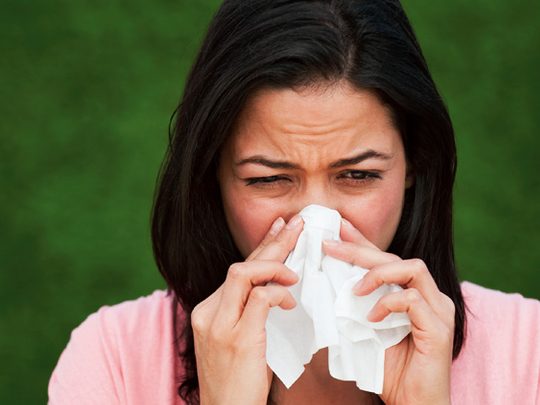
Dubai The weather change could bring with it allergy symptoms including a stuffy, runny nose or stinging eyes, making you reach out for tissue after tissue.
The main airborne allergens (substances that cause allergic reactions) are pollen and dust whereas indoor substances like house dust mites and mould spores are behind allergy attacks year round.
The change in season will bring on a spate of airborne allergies, cautioned allergy specialists, who advised necessary precautions.
Allergies, which can interfere with daily activities and impact quality of life, are known to reduce productivity and lead to absenteeism at work and at school.
Specialists told Gulf News the most common allergies this time of the year are allergic rhinitis (hay fever), allergic conjunctivitis and allergic asthma.
Allergic rhinitis is caused by pollen as well as pollutants like mould, dust mites and animal dander. It presents symptoms including sneezing and runny nose.
Allergic conjunctivitis is similar to allergic rhinitis in causes and symptoms, but it affects the eyes as well. Allergic asthma symptoms include wheezing and persistent cough, especially at night or early morning, triggered by mould spores, pollen and dust. Exposure to cold air too can cause lung inflammation, causing a cough.
To explain what happens during an allergic reaction, Dr Hussain Hattawi, Consultant and Head of Immunology at Dubai Hospital, said, that the body’s immune system reacts to an allergen such as pollen or dust mites as if it were harmful.
“If the immune system [body’s natural defence against infection and illness] is oversensitive, it reacts to allergens by producing antibodies to ward off the harmful allergens. Over time, the body becomes sensitised to a specific allergen. So when antibodies detect an allergen, they release chemicals to fight the intrusion resulting in symptoms like sneezing and a runny nose,” he said.
Of common allergens, Dr Hattawi said, dust mites or microscopic insects are found in carpets, pillows and beds; a chemical found in their excrement triggers an allergic reaction. Dust mites feed on the dead flakes of human skin.
“Other allergens common during seasonal changes are tree and grass pollen whereas mould spores grow on decaying matter indoors and outdoors, and increase in hot and damp environments,” he said.
To understand why some people are at a higher risk, Dr Hattawi said that some people become oversensitive to allergens. “Medically we refer to this as atopic or to have atopy, which means that such people produce more antibodies than others. In addition, the chances of developing allergies increase if you have grown up in a household with smokers, your exposure to dust mites and pets, as well as if you have overused antibiotics.”
Dr Hattawi warned against the long-term use of decongestant nasal sprays.
“Decongestant nasal sprays should be avoided, especially in the long term, as they can cause rebound congestion and reduced efficacy over repeated use. Anti-histamines [to treat allergy] can be used, but one has to be aware of their potential side effects like drowsiness, weight gain and, in rare cases, heart arrhythmias [irregular heartbeat],” he said.
On prevention strategies, Dr Uchil Lalit, Specialist Internal Medicine at Mediclinic Al Sufouh, Dubai, said that in general those susceptible should avoid triggers, and those with an exitising allergies should avoid contact with any allergen.
“During peak pollen-release hours — early morning and evening — windows should be closed. Avoid drying clothes outside when the pollen count is high and avoid grassy areas like parks.
“To prevent mould spores, keep your home dry and well ventilated. To prevent dust mites, vacuum and dust interiors — with a damp, clean cloth — regularly. Cover upholstery, mattresses and pillows in allergy-resistant material. And, in general, avoid pets and all kinds of smoke-filled environments, including those with cigarette smoke,” he said.












